THE NUMBERS GAME
Mary Glucksman on the distribution hits and misses of the Sundance class of 2003.
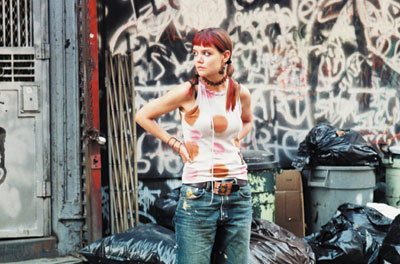 |
| Peter Hedges's Pieces of April. Photo: Teddy Maki. |
The numbers always tell the story. While Lions Gate was busy buying Artisan and the indie world was rallying against the screener ban, My Big Fat Greek Wedding distributor Bob Berney was working another indie sleeper hit. This year it was Whale Rider, which Berney bought at the Toronto Film Festival in 2002 to launch the new Newmarket Films. And if its $20.8-million gross sounds like small potatoes, consider that mighty Miramax made less than that on its three top-earning acquisitions combined (about $4.5 million each on City of God and The Magdalene Sisters and $8 million on Dirty Pretty Things).
In fact, only six indie fiction features — three horror pics and three female-helmed films — released in 2003 scored double-digit box office. Besides Whale Rider, the latter trio included Sofia Coppola’s critical favorite Lost in Translation (Focus Features) at $30 million and Gurinder Chadha’s Bend It Like Beckham (Fox Searchlight) at $32.5 million. Searchlight also had the high grosser of the scarefests with in-house 28 Days Later at $45 million. United Artists’ Jeepers Creepers sequel made a fast $35 million; Lions Gate’s low-budget 2002 Toronto acquisition Cabin Fever passed $21 million. And while Paramount took Sundance pickup Narc to $10.5 million after a late 2002 release, the next best performance from an American indie released in 2003 was IDP’s little-heralded Mambo Italiano at $6 million.
Documentaries, meanwhile, performed in record numbers, with four distributors earning considerably more than the narrative features on their slates. From Winged Migration’s birds (Sony Classics, $10.7 million) and Spellbound’s wacky kids (ThinkFilm, $5.7 million) to Step into Liquid’s surfers (Artisan, $3.7 million) and Capturing the Friedmans’ family under fire (Magnolia, $3.1 million), the docs were the hits of the house. Just as startling, tiny Roxie Releasing pushed Rivers and Tides past $2 million this summer after a 14-month run. Add to this $732,000 for IFC’s Lost in La Mancha, $500,000 each for Shadow’s The Weather Underground and New Yorker’s To Be and To Have, $405,000 for Artisan’s Amandla! and $300,000 for Artistic License’s Tibet: Cry of the Snow Lion and you can spell that t-r-e-n-d. Equally telling, only three out of two dozen available English-language fiction films premiering at Toronto last year found buyers, whereas docs Touching the Void, The Yes Men and How to Get the Man’s Foot Outta Your Ass! were snapped up by IFC, UA and Sony Classics, respectively.
The big news among the studio affiliates was the birth of arthouse divisions at Dreamworks (Go Fish) and Warner Bros. (Warner Independent Pictures), although the former seems barely active while the latter has yet to demonstrate deep pockets. Of the seven major-studio subsidiaries, a ramped-up Focus became the house to watch with Translation, 21 Grams and the year’s best box-office performance by a foreign film, in Swimming Pool ($10 million).
Fox Searchlight’s frequently cited marketing savvy took 28 Days and Beckham to top box office and Sundance pickup Thirteen to solid numbers. The company held its biggest gun, Oscar hopeful In America, for year’s end. Miramax had predictable moneymakers in Spy Kids, Kill Bill and Cold Mountain but maintained indie street cred with Sundance buy The Station Agent. Other pickups, such as Blue Car, Jet Lag, People I Know and Buffalo Soldiers, failed to connect with audiences, as did big-budget in-house productions Duplex, The Human Stain and View from the Top.
Neither UA nor Paramount Classics fielded a true indie hit, but UA could laugh all the way to the bank with Jeepers Creepers 2’s $35 million, while Paramount’s half-dozen releases totaled just $5 million, The Singing Detective included. (The division did lend its name to sister Viacom subsidiary MTV Films’ release of 2002 Sundance cause célèbre Better Luck Tomorrow for a healthy $3.8 million return.) Sony Classics held The Statement, The Company and Fog for year’s end and in the meantime scored the biggest successes of its cover-the-waterfront slate with Migration and pre-buy Laurel Canyon ($3.6 million). Fine Line, more or less on hold while president Mark Ordesky oversaw the Lord of the Rings films, became energized by a new HBO distribution partnership that has already yielded American Splendor and Elephant. Former UA/Trimark/Universal Focus exec Dennis O’Connor was brought on to oversee the distribution of the HBO titles.
Lions Gate remains the only true independent substantial enough to bid with the big boys (it got The Cooler at Sundance) and, free from the restraints of a conservative parent corporation, is able to release controversial unrated material such as Irréversible. With a mix of foreign and indie acquisitions (May, Stevie) and in-house productions both Oscar-possible (Girl with a Pearl Earring) and popcorn-reliable (Confidence), its smartest move this year was buying and marketing Cabin Fever.
The news at smaller indies was decidedly mixed. Cowboy filed for bankruptcy after six years, several dozen critically acclaimed films and a recent unsuccessful partnership with Greg Williams’s Lot 47 Films. Fifteen-year-old Zeitgeist, meanwhile, logged its first-ever Academy Award and its best box-office return ($6 million!) for Nowhere in Africa. That’s a stark contrast to the year endured by similarly sized Palm, Wellspring and Strand, who fielded half a dozen releases each and saw none pass mid-six-figure box office, although Wellspring pushed 2002 release Russian Ark to an eventual $3 million. IFC rang no Wedding bells with Camp’s $1.6 million, the best of its eight releases. Manhattan Pictures drilled $3.6 million from its sole offering, The Secret Lives of Dentists. ThinkFilm scored with Spellbound and The Gospel of John ($2.3 million) but had to be disappointed with low numbers on Gerry and co-production The Event. So how does Samuel Goldwyn do it? The only partner of the three originals under the IDP umbrella still standing since Fireworks shuttered this year, it pushed five of six indie releases past $1 million, including a cool $2 million for Raising Victor Vargas and Mambo’s $6 million. (Goldwyn was joined in the IDP venture late in the year by Roadside Attractions, a start-up distributor headed by former UTA agent Howard Cohen and producer Eric d’Arbeloff.)
What are we leaving out? Not a lot. The films named above include the only U.S. indie acquisitions banking more than $1.5 million at the box office last year. Below you’ll find case histories of six 2003 Sundance dramatic Competition titles sold at the festival and released through October.
THE FILMS
AMERICAN SPLENDOR
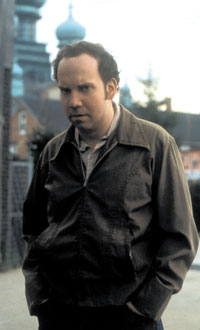 |
| Shari Springer Berman and Robert Pulcini's American Splendor.
Photo: John Clifford/HBO/Fine Line. |
The Financing: Producer Ted Hope gets a lean $2 million from Maud Nadler’s independent unit at HBO Films, upped to $3 million in post, after years of development dead ends.
The Deal: To HBO’s sister Time Warner subsidiary Fine Line Features a week after the fest for an undisclosed amount. The deal precedes July’s formal announcement of the HBO/Fine Line partnership. Former Tequila Gang/The Works exec Rosa Bosch is hired to launch HBO’s new foreign sales arm at Cannes and sells American Splendor to Japan, Australia, Israel, France and the U.K., among other territories, but ankles the gig just months later; partner Penny Wolf remains. Warner Home Video’s extras-loaded DVD is out February 3.
The Release: Made for marketing. The movie poster’s everywhere, including the cover of a brand-new paperback anthology of the American Splendor comic. Pekar does Charlie Rose, NPR and annual extravaganza Comic-Con and gets his own comic on the New York Times op-ed page as well as panels in Entertainment Weekly. Reviews sparkle with superlatives: “simply splendid” (Film Threat), “spot-on” (Rolling Stone), “entirely mesmerizing” (Atlanta Journal-Constitution). When the East Coast blackout hits three of Splendor’s four opening markets on August 14, the filmmakers respond with a hilarious Pekar-drawn newspaper ad in which the artist bemoans his lousy luck.
The Outcome: Even with the blackout, American Splendor pulls in a first-weekend average close to $27,000. It makes $3 million in four weeks and $6 million in 15.
Winners and Losers: Berman and Pulcini are catapulted out of doc obscurity; their next assignment is adapting the popular novel The Nanny Diaries for Miramax. It’s a win-win year for Fine Line, HBO Films and producer Ted Hope, for whom this film was a 10-year-gestating labor of love.
CAPTURING THE FRIEDMANS
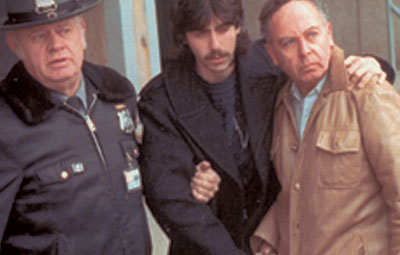 |
| Andrew Jarecki's Capturing the Friedmans. |
The Film: Rashomon-like tale of a father and teenage son convicted of molesting dozens of young boys and the consequent implosion of their suburban New York family. This first film from Moviefone founder Andrew Jarecki makes ample use of the family’s often damning home movies, driving home points about the elusive nature of the truth. A clear standout in the festival’s documentary competition, it wins the Grand Jury Prize.
Financing: With Moviefone sold to AOL in 1999 for $388 million, self-financing is not a problem.
The Deal: Jarecki teams with sales rep John Sloss (Cinetic) at Sundance, but most bigger distributors are scared by the subject matter or won’t commit to the participatory role Jarecki wants to play. A unique deal is sealed months after the fest provides for a three-way partnership among Magnolia Pictures, HBO Documentary Films and Jarecki himself for a theatrical release he’ll micromanage with Magnolia whiz Eamonn Bowles. They plan a launch just before the summer blitz with an HBO TV premiere to follow. International goes to Fortissimo in time for Cannes sales to France, Benelux, Austria, Italy, Israel and the U.K., followed later by Australia, Mexico and New Zealand. A two-disc DVD with tons of extras is out January 27 from HBO Video in a separate deal negotiated later.
The Release: Some of the year’s best reviews: the New Yorker’s David Denby calls Friedmans a masterpiece; “haunting,” says Ebert. The film gets nine separate articles in the New York Times, from the legal section to the op-ed page. Jarecki does the Today Show and Charlie Rose and leads Q&A’s at screenings around the country. “We didn’t have to spend much on advertising because it was so publicity-driven,” Bowles says. “I thought the subject matter was going to be more difficult to get past, but the film hit a chord, and it got incredible word of mouth. People hung out for hours discussing it — I’ve never seen audiences get engaged like that.”
The Outcome: Its May 30 weekend release in three New York theaters sets a box-office record for a documentary at the Angelika Film Center. Friedmans makes $3.1 million in three months after a slow rollout with a maximum of 78 theaters midrun. That makes it the top-grossing Sundance doc in memory.
Winners and Losers: An Oscar nomination looks probable when Friedmans makes the 12-film documentary shortlist circulated in November. The film’s a year-saver for Bowles, and HBO’s on a roll that could define a decade. Losers? The conservative theatrical distributors who continue to concede tough but marketable subject matter to both indie distributors and HBO.
DOPAMINE
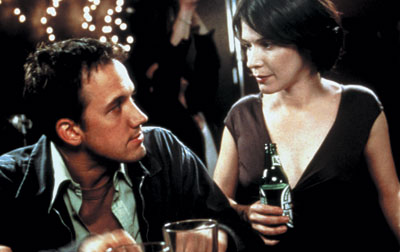 |
| Mark Decena's Dopamine. |
The Film: The tale of an antiromantic San Francisco A.I. developer ambushed by his sudden attraction to a woman. The Hi-Def drama is a first feature for director Mark Decena, who workshopped the script at the Sundance Lab in 1998 with co-writer Timothy Breitbach. With no names in the cast, it’s largely ignored in Park City but wins the festival’s Alfred P. Sloan prize for features addressing science and technology. (“It should have been entered in a science fair instead of a film festival,” quips Variety.) San Francisco slots it on closing night, but the filmmakers skip further fests to recut.
The Financing: Decena, Breitbach and producer Tad Fettig are partnered in San Francisco hipster ad agency Asylum and commercial production house Kontent and raise a budget quoted privately as “under $1 million.”
The Deal: All North American rights are sold by Jeff “The Dude” Dowd to the nascent Sundance Film Series in April. Much like the late, lamented Shooting Gallery Film Series, the Sundance Film Series plucks undernoticed films from festivals, offering guaranteed two-week day-and-date runs at Loews theaters in 10 cities including New York and L.A. The filmmakers get a small advance and theoretical backend in a deal that comprises a Sundance Channel TV premiere and a Sundance Home Entertainment video/DVD release; most unusual is a reported $10-million-plus p&a budget fronted by big-ticket sponsors Loews, Volkswagon, Coca-Cola, Kenneth Cole and Entertainment Weekly. Newmarket’s Bob Berney promises to take high-performing entries on for extended runs; tapped for the inaugural Series are The Other Side of the Bed, In This World and Die Mommie Die.
The Release: Reviews are wan, but TV ads roll out, and there is plenty of exposure on the Sundance Channel. But will Dopamine’s billing as the first film supported by every Sundance division from lab through theatrical and beyond mean anything to audiences?
The Outcome: The opening weekend, October 10, totals a so-so $25,075 on 10 screens. Dopamine does $70,000 in five weeks after reducing theaters to seven, four and one, while Series top-grosser Mommie clears $200,000 in four weeks. The film plays longer in the filmmakers’ hometown of San Francisco.
Winners and Losers: Series pickup takes Dopamine much further than was evident it had the potential to go on its festival debut. Yet-to-sell international could pay back investors, but with box office like this, is the Sundance mystique enough to bring Series sponsors back for another round?
PARTY MONSTER
 |
| Fenton Bailey and Randy Barbato's Party Monster. |
The Financing: Killer Films works the project for several years before locking in financing in a 60/40 split between Fortissimo Film Sales — backing their first U.S. indie in exchange for international rights — and Ed Pressman and John Schmidt’s ContentFilm. The budget’s reportedly close to $2 million for the Sony PD-150 shoot; the use of digital video helps shift production dollars to wardrobe and production design.
The Deal: ContentFilm hopes for a seven-figure domestic sale. But bad festival buzz lands them with Strand Releasing four months after the fest. Strand handles theatrical only; ContentFilm sells video/DVD and U.S. TV to Blockbuster first. Top indie label TVT takes the soundtrack, and Fortissimo, which has been screening a showreel for months before Sundance, sells Japan, Greece, Hungary, Benelux, the U.K., Iceland, Turkey, Russia, Australia and more.
The Release: Labor Day weekend in San Francisco with six New York, L.A. and Chicago theaters added the following Friday, nicely timed to Barbara Walters’s 20/20 interview with Culkin. Reviewers from Variety to Ebert praise the film’s period elements, but common adjectives pop up: “grotesque,” “indigestible” and “vapid.”
The Outcome: No crossover here. The first and second weeks sport great averages of $28,000 per theater. Strand economically works 13 prints, taking six weeks to clear $500,000 and a further six to reach $683,000. It squeaks past $700,000 Thanksgiving weekend. “It will have played over 100 markets by Christmas,” says Strand partner Jon Gerrans.
Winners and Losers: Bailey and Barbato head back to docudrama for a Linda Lovelace biopic with HBO and producer Brian Grazer. Culkin gets a development deal at NBC. Fortissimo gets mileage talking up their first U.S. film investment and new Bank of Scotland credit line, but its foreign buyers — and ContentFilm—have to be disgruntled at the picture’s stateside underperformance.
PIECES OF APRIL
 |
| Peter Hedges's Pieces of April. Photo: Teddy Maki. |
The Film: Novelist and screenwriter Peter Hedges (What’s Eating Gilbert Grape) makes his directing debut with this tragicomic Thanksgiving weepie about a rebel daughter (Katie Holmes) forging a truce with her acerbic, terminally ill mom. Patricia Clarkson cracks wise as the mom; the supporting cast includes Derek Luke (Antwone Fisher), Oliver Platt (Bulworth) and Sean Hayes (TV’s Will and Grace). Sundance audiences bawl, and Hedges himself breaks down at the premiere as he describes the film’s genesis in his own mother’s cancer year.
The Financing: April’s already fallen apart twice when UA’s Bingham Ray sets it up in-house with a $6-million budget. Hedges is in Toronto to start preproduction when UA parent MGM suddenly pulls the plug. Twenty-four hours later April gets a green light from Gary Winick, John Sloss and their IFC-financed InDigEnt (Tadpole, Personal Velocity). Hedges and producer John Lyons shave their budget by $5.8 million and keep their high-powered cast together. Hedges gets just two weeks to prep and 16 days to shoot.
The Deal: A bidding frenzy ends in the highest price tag of Sundance last year at $4 million for worldwide rights to, ironically, the film’s former financier, UA.
The Release: UA pulls out the stops with TV ads. Holmes does Letterman, The View, LIVE with Regis and Kelly, Saturday Night Live and MTV’s Total Request Live, and the whole cast has Dinner for Five. The reviews are mixed, with most praising the cast but some calling the film pat and formulaic.
The Outcome: The October 17 release in six theaters in New York and L.A. brings a respectable $48,000. After gradual expansion to 95 theaters, April passes $1.5 million in its sixth weekend. At this rate, the gross should top $2.5 million.
Winners and Losers: Hedges is inundated with directing offers but opts to write another personal screenplay following one big-ticket screenwriting gig: adapting The Devil Wears Prada for Fox 2000. InDigEnt scores big with its third hit in a row after Tadpole’s $5-million bonanza and Personal Velocity. Producer Lyons segues into the production president spot at Focus. But UA had to be imagining a bigger box office when they anted up that $4 million.
THE STATION AGENT
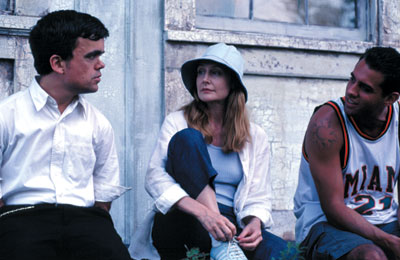 |
| Tom McCarthy's The Station Agent. |
The Film: A gem of a comedy about an antisocial dwarf obsessed with trains who moves into a derelict rail station and is drawn into friendships with a lonely hot-dog vendor and a grieving woman. The first feature by actor Tom McCarthy (Meet the Parents) has dubious prospects going into the festival — the catalogue copy sure doesn’t make it sound like a must-see — but its warm performances and comic rhythms make it an instant audience hit. The film wins a rare three awards: audience, Waldo Salt Screenwriting and a shared acting award for Patricia Clarkson. Peter Dinklage (Living in Oblivion) earns raves in the lead, but the real surprise is TV’s Bobby Cannavale (Third Watch).
The Financing: Maybe it helps that it takes McCarthy three years to attract funding, during which time he and pals Dinklage and Cannavale, for whom he rewrote their roles, tinker endlessly with the script and work out the scenes on video. Newcomer Robert May and his SenArt provide the mid-six-figure budget, and the film is produced by Antidote’s Mary Jane Skalski (The Jimmy Show) and Kathryn Tucker.
The Deal: Miramax snags all English-speaking territories plus Italy for an official $1.5 million. Sources say, however, that the purchase price was substantially higher. Bidders were said to include Focus, Fox Searchlight, Sony Pictures Classics, Screen Gems and Newmarket. Alliance Atlantis queen Charlotte Mickie buys international rights at the AFM and quickly sells wide swathes of Europe as well as Israel.
The Release: The reviews are rapturous, and Miramax does a classic old-school indie marketing job, planting print features and working demos large and small. Dinklage does Leno in time for Agent’s third week.
The Outcome: An October 3 release in three New York and L.A. theaters has a $19,000 per-screen average, the weekend’s highest. The second weekend in the same theaters averages more than $14,000 per; gradual expansion tugs the box office past $1 million after a fifth weekend in 86 theaters and $2 million after a seventh in 120. An eighth weekend in 150 spots steams past $2.5 million. By December it’s at $3.5 million and holding on strong with a bump to 200 theatres.
Winners and Losers: McCarthy gets an Open Palm nomination and directing offers but opts to hold out to develop another original idea. Dinklage is red-hot after this performance and is headed for the Lincoln Center stage as Toulouse-Lautrec. Miramax spins Cannavale into its Shall We Dance remake and pushes Clarkson for the best-actress Oscar to avoid a split vote in the more logical supporting-actress category that UA’s staking out for April.
THIRTEEN
 |
| Catherine Hardwicke's Thirteen. |
The Film: Scary movie! Top production designer Catherine Hardwicke (Three Kings, Vanilla Sky) turns director with this grueling tale of teenage girls gone wild co-written with actual 13-year-old Nikki Reed, Hardwicke’s ex-boyfriend’s daughter, who gets to co-star with Evan Rachel Wood (The Missing) and Holly Hunter. The tagline, “It’s happening so fast,” could apply to Hardwicke, who walks off with Sundance directing honors and bags further prizes at Locarno and Deauville.
The Financing: Hardwicke meets Antidote Films producer Jeff Levy-Hinte while production designing Laurel Canyon. Levy-Hinte raises equity financing off a simply shot sample scene and then, through producing partner Michael London, hooks in a mid-six-figure infusion from U.K.–based Working Title. Total budget: $1.8 million.
The Deal: ICM sells at the festival to Fox Searchlight for $2 million for worldwide rights excluding the U.K. (which Working Title keeps). The deal would have been one of the first finalized at this year’s fest, but it temporarily bogged down in bickering between the two companies over — get this — opening credit logo placement.
The Release: With an “R” rating limiting target teens to attendance with an adult, Searchlight focuses on the film’s potential for mother/daughter détente and sponsors special event screenings that attract the desired issue-oriented ink. Oprah devotes a whole show to the film (“Is Your Child Living a Double Life?”), and Hunter and the teens get separate invitations to The View. Wood does Good Morning America, and Reed does Carson Daly and NPR, as print press from teen magazines to major newspaper arts sections jump on the bandwagon. An ad blitz nicely complements top-notch reviews that effectively sensationalize the film while cataloguing its particular virtues.
The Outcome: An August 19 midweek release in five theaters is smart summer counterprogramming. The first weekend’s boffo three-day $23,252 theater average assists Thirteen past $1 million after a second-weekend expansion to 74 spots. With a maximum of 243 theaters on weekend five, the film banks $4.5 million by late October.
Winners and Losers: Hardwicke gets tapped for a rewrite and directing gig on a Columbia skate-culture picture adapted by Dogtown and Z-Boys director Stacy Peralta from that documentary. Levy-Hinte’s Antidote is on a roll, with Gregg Araki’s Mysterious Skin wrapped and new films from the directors of Secretary and Love Liza gearing up. With worldwide rights, Searchlight banks profits and yet another example of their marketing smarts: the awards pitch focuses on screenwriting and acting nominations, with prior winner Hunter (The Piano) the film’s most realistic Oscar shot.
Go to: The 2003 SUNDANCE THEATRICAL BOX OFFICE CHART.
VOD CALENDAR


 See the VOD Calendar →
See the VOD Calendar →


